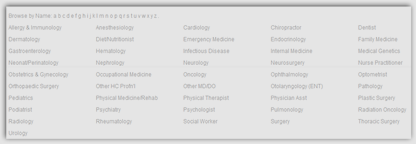This is an interesting service and could be very useful and you can watch the video below to see how it functions for doctors to have their own network to  communicate wit
communicate wit
This is an interesting service and could be very useful and you can watch the video below to see how it functions for doctors to have their own network to  communicate with each other. The service is free so you assume there has to be a way to generate money to keep operating and you can read the full disclosure here but basically what I found in reading the disclosure is the use of anonymized data and there are many companies doing that today, just read here regularly enough for that matter:) You can adjust your listing and I would say if nothing else if you didn’t want to be listed the resources of finding drugs stores, hospitals and so forth would show some value here.
communicate with each other. The service is free so you assume there has to be a way to generate money to keep operating and you can read the full disclosure here but basically what I found in reading the disclosure is the use of anonymized data and there are many companies doing that today, just read here regularly enough for that matter:) You can adjust your listing and I would say if nothing else if you didn’t want to be listed the resources of finding drugs stores, hospitals and so forth would show some value here.
“Doximity takes the privacy of Users very seriously. We do not sell, rent, or otherwise provide your private information to third parties for marketing or other purposes. We may provide aggregated anonymous data about the usage of our services to third parties for such purposes as we deem, in our sole discretion, to be appropriate, including to prospective investors in Doximity. We may segment our Users by specialty or geographic location. We may aggregate or provide information from your public profile. If you would like to be excluded from the aggregated research or products based upon aggregated data about our Users’ activities on the site, please email support@doximity.com.”
As stated on the website, the program was created and founded by former members from ePocrates. Mobile applications are available for the Iphone and Android and it can be used on the web as well. 
Text messaging back and forth between members is encrypted, unlike standard text messages when using the network. Images can also be exchanged between doctors. The service also checks credential to make sure each member is a verified healthcare professional, unlike the other web services that we see out there today with companies such as Healthgrades to name one. There is no consumer interactions here, just a network of doctors to communicate securely. At the bottom of the website you can search and look for current members. Without being a member and as a consumer I could find names of members but that’s about it.
Obviously as the article states normal social networks of course are taboo for any communication of this type and common sense just tells us that so perhaps we have an answer to an alternative solution for doctors to where their business is kept among themselves? The feature of finding former classmates and residents is not bad either. One more interesting item is the use of faxing, just in case these days:) BD
Or so says Jeff Tangney, founder and CEO of the San Mateo, CA-based startup, which raised $10.8 million in Series A funding this spring from Emergence Capital Partners and Interwest Partners. Tangney was the longtime president and chief operating officer at Epocrates (NASDAQ: EPOC), the provider of mobile drug reference tools that raised $86 million in a February IPO. And Doximity is what Epocrates probably would have been if smartphones had existed in 1999, when Tangney started the company: a combination medical directory, list maker, and secure messaging tool that runs on any iPhone or Android phone. He says the service is designed to help overcome the information barriers that currently make it difficult for doctors in different practices or hospitals to communicate about patient care.
Since introducing the iPhone version of the service in December, Doximity has already signed up 17,000 physicians. “I believe that a megatrend we’re seeing in other parts of the enterprise software landscape—end users increasingly making their own choices about the technology that will help them do their jobs better—will come to healthcare,” says Kevin Spain, a general partner at Emergence Capital Partners. “Doximity is riding this trend by bringing easy-to-use collaboration tools to physicians.”
At its core, Doximity has just five elements:
• Personal profiles, customizable so that doctors can add areas of expertise, publications, and the like.
• A directory of all U.S. physicians, searchable according to their locations, their specialties, the medical schools they attended, and the languages they speak.
• A directory of pharmacies, hospitals, labs, and other medical facilities.
• A private phone list for quick access to local colleagues.
• “DocText,” a HIPAA-compliant mobile messaging system that allows doctors to exchange encrypted text messages and photos and get confirmation that individual messages were received.
The first four features are “a little more lightweight” and basically function as a physicians’ equivalent of Facebook or LinkedIn, Tangney says. Generally, doctors can’t use the real Facebook or the real LinkedIn because they’re not HIPAA-compliant—and the population of physicians isn’t large enough to make it worth either company’s time to develop compliant versions.
Doximity: A Mobile Facebook for Doctors, but With Real Privacy Protections | Xconomy








